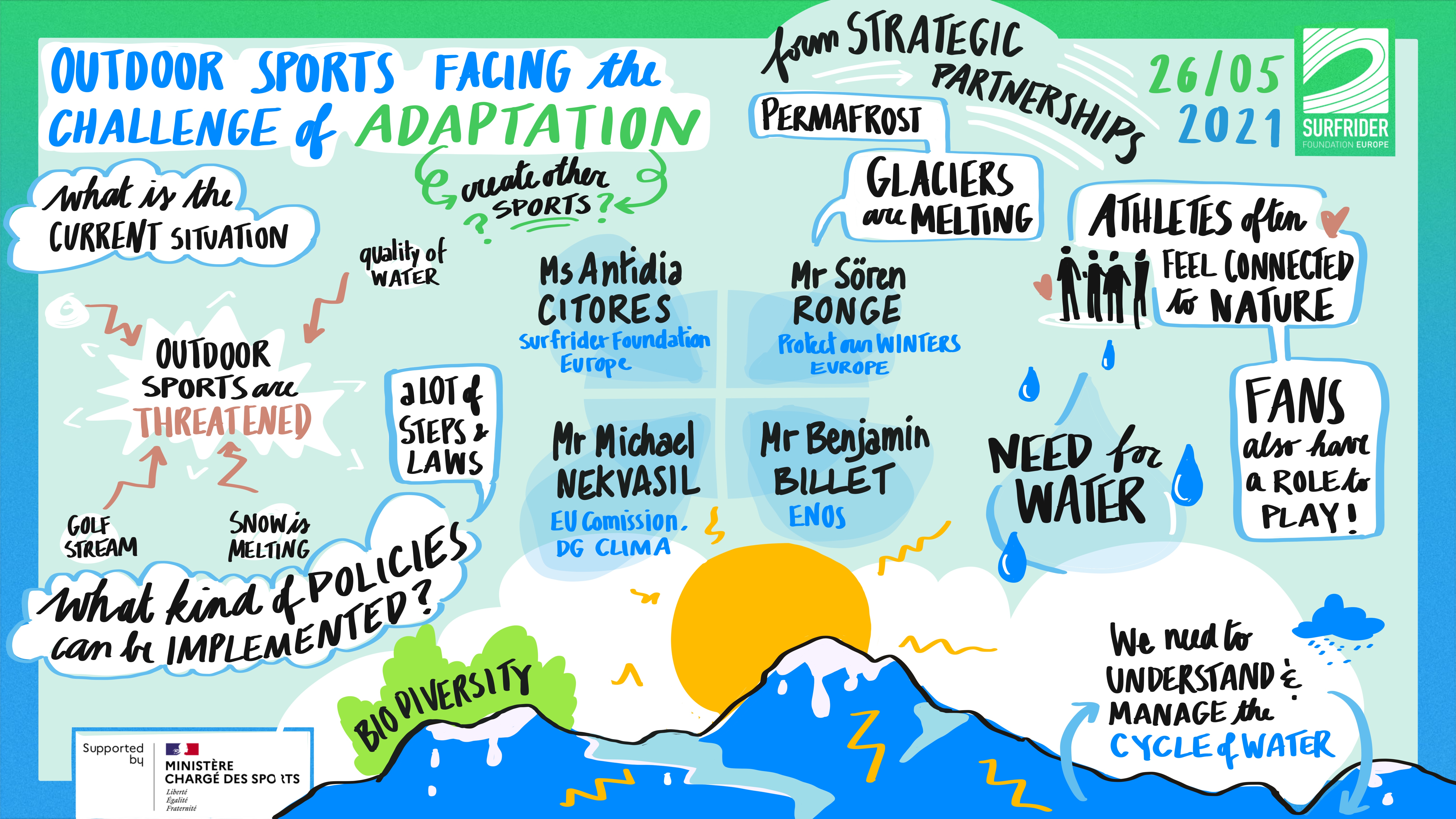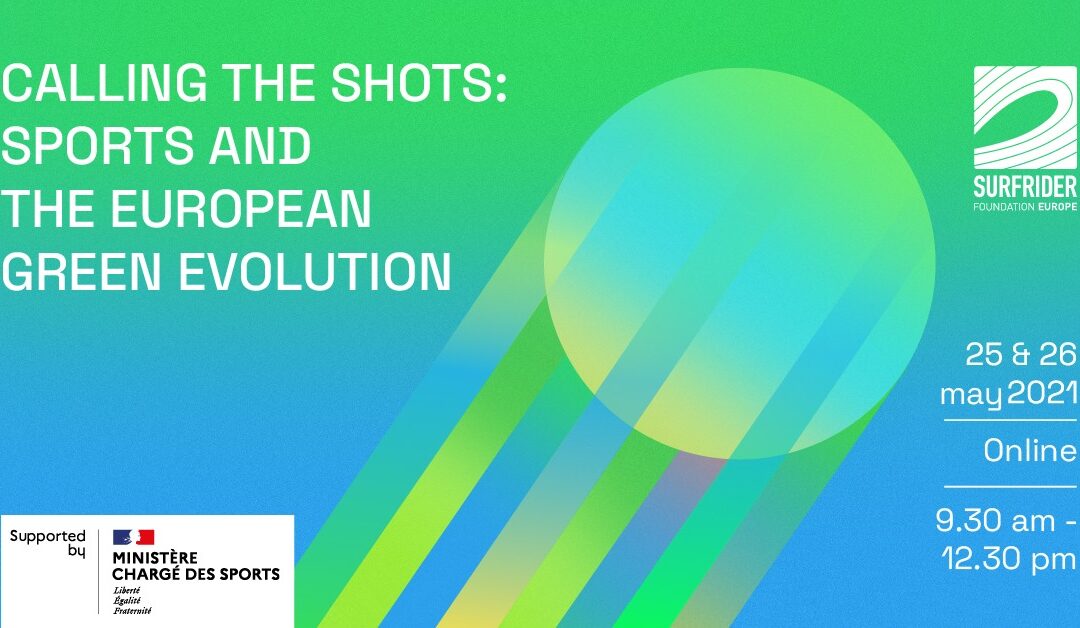On May 25 and 26th, Surfrider Foundation Europe invited European Sport stakeholders at European level to a dialogue on sport in the background of the urgent need of waste reduction, carbon footprint reduction, adaptation to climate change, in presence of French Sports Minister Roxana Maracineanu, IUCN deputy director Giulia Carbone and Peter Fischer, Policy Officer, Green Sports Expert Group’s Coordinator, European Commission Directorate General for Education, Youth, Sport and Culture (DG EAC).
Virtually every type of outdoor sport is affected by climate change from snow-skiing to whitewater activities. For countryside recreation, climate change is having a more indirect, but no less potent effect. A recent study has shown that 9 of 10 outdoor sports professionals from Italy and France working in the Alps were observing a direct or indirect impact on their professional activity. Global warming impacts on visitors, places and the activities themselves. Certain types of outdoor sports, such as whitewater rafting, kayaking and other water-dependent activities, are already facing a high likelihood of disruption. For much of the year water levels may be too low to kayak, raft or canoe, or alternatively, the places to do so might have been damaged by storms and flooding. Unseasonable storms are becoming a common occurrence. It’s great for wave surfers but makes sports at sea like sea diving, sailing, kayaking dangerous.
The ways that the public recreates outdoors are already undergoing dramatic changes. Recreation options in many urban areas have become much more limited in the face of extreme heat waves. Physical exercise and high output activities in summer when the temperature is 37 degrees or higher are not as enjoyable or safe as in moderate temperatures. A changing climate is likely making weather events like extreme rainstorms, heat waves, and severe drought worse. Such conditions directly affect how people recreate, limiting options or making it unhealthful to engage in outdoor activities. It is possible that some activities, such as certain types of water and snow-based recreation, may disappear entirely in certain regions of Europe. Snow sports are some of the most affected by climate change. Snow seasons are shrinking and commercial operators are seeing many more lost days in peak seasons because of highly unpredictable weather and shorter shoulder seasons as well.
Right at the outset when ENOS was formed the members wanted to address the area of sustainability so every ENOS member signs a charter and commits to meet agreed sustainability standard. This charter is a way to speak a message to the outdoor sports community members about how their connection with the outdoors enables and empowers them to be activists. The key message is “to play outside is to love the outdoors and and to love the outdoors is to take action on account of those landscapes, ecologies, ecossystems and to take action”. ENOS also promotes messages of how to behave responsibly and sustainably in natural protected areas and has developed 10 principles for responsible use of protected areas, in partnership with the EUROPARC Federation.
Educating people is also important to make sure that outdoor sports communities are aware about how their sports affects different landscapes, how environmental justice comes into play and just letting people understand that all these things are interconnected and that they are related and the more people know the more people will make informed decisions.
Our house is not in order!
The preliminary results of the Erasmus+ funded project SEE coordinated by Leave no Trace Ireland in partnership with the Europarc Federation and is currently mapping and analysing the environmental information that is made available to both outdoor sports participants and trainings for trainers, eductors and outdoor sports professionals are indicating a lack of policy within our sector requiring an increased commitment to a coordinated approach to outdoor education accross Europe. A results that aligns with the recent German study from Bielefeld Univeristy on carbon footprint of active sports participants that revealed participants in nature sports had the highest emission levels. Regression analyses revealed that environmental consciousness significantly reduced carbon footprint in individual sports, but not in team/racket and nature sports, supporting the existence of an environmental value-action gap. Our house is not in order;
But we know that the outdoor sports community is authentically passionate and care for the environment so there is a gap here and room for improvement. We can and should better leverage peoples passion for their sports, motivate them and empower them to pursue change for the better, and become environmental transition champions.

Takeaways from the conference
“Sport has to take its place in environmental policies and in the European Green Deal. We mustcreate link between ministries. That’s what have been done, for example, with Ministry of ecological transition with C2E/ESA (Energy Saving Agreements) which allow companies to reverse ecological fees to Ministry of Sport to spread the Bike driving training program in schools.” Saisd the French Sports Minister Roxana Maracineanu. She pointed out the upcoming French Presidency “After the French presidency of European Union which will raise the issue of Sustainable Development and Sport, Czech Republic will follow by focusing on sustainable equipment. Sweden is willing to address the area of environment and sport”.
At a time when the EU is raising its climate ambitions and promising to reduce its greenhouse gas emissions by 55% by 2030, sport must also jump on the bandwagon and accelerate its ecological transition. At the conference, participants were unanimous in saying the sports sector should be seen like any other industry. According to Peter Fischer, Policy Officer, Green Sports Expert Group’s Coordinator, European Commission Directorate General for Education, Youth, Sport and Culture (DG EAC), this starts by “pointing out bad practices” and taking up an “educational challenge”. Peter Fisher underlined that “European Green Deal is a great opportunity to implement sustainable sport practices and that we can lie down on inspiring sport activists, and not only on famous stars to raise awareness and invite people to change their practices.”
The ENOS network was represented at a panel discussion called Outdoor sports facing the challenge of adaptation guesting Ms Antidia CITORES Spokesperson & Lobbying Manager, Surf rider Foundation Europe, Sören RONGE Protect Our Winters Europe POW-Mr and Mr Michal NEKVASIL Climate Change Adaptation Expert, European Commission DG, and Benjamin Billet outdoor sports policy officer at the French Sports Ministry.
Watch the conference in replay on Surfrider Youtube Channel, or have a look at the drawings by drawing artist Mara Skuja and the full daily reports.
Surfrider Foundation Europe is an ENOS Member and a non-profit organization which aims to protect and showcase the importance oflakes,rivers, theocean,wavesandcoastlines. Created in 1990, it now has over 15,000 members, active in 12 countries with 49 volunteer-runbranches and 5 local offices. It has recognized authority in three areas of expertise, Marine litter, Water quality and public health, Coastal management and Climate change. Sport and ecology are part of the DNA’ of Surfrider. Surfrider Europe was created by Tom Curren, triple World Surfing Champion who brought nautical users protection to the core of his mission. Surfrider Europe is now involved at the spearhead of the Sport & Sustainability movement through its environmental support to the Olympic Games PARIS 2024 or the coordination of the pan-European initiative, Green Sports Hub Europe.CONTACT:Lionel Cheylus(he/him)| Press Relation Manager |+ 33 (0) 608 10 58 02 |lcheylus@surfrider.euNevena Vukasinovic(she/her)| BCW| Tel. +32 492 155 380 | Nevena.Vukasinovic@bcw-global.com

